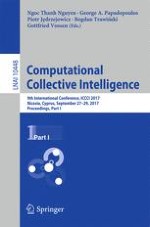2017 | OriginalPaper | Buchkapitel
Particle Swarm of Agents for Heterogenous Knowledge Integration
verfasst von : Marcin Maleszka
Erschienen in: Computational Collective Intelligence
Aktivieren Sie unsere intelligente Suche, um passende Fachinhalte oder Patente zu finden.
Wählen Sie Textabschnitte aus um mit Künstlicher Intelligenz passenden Patente zu finden. powered by
Markieren Sie Textabschnitte, um KI-gestützt weitere passende Inhalte zu finden. powered by
